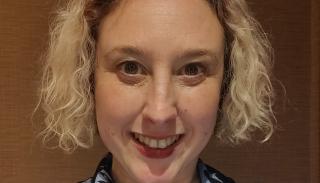
Breadcrumbs navigation
In discussion: Victoria Basham
We recently announced the election of new members of our Executive Committee. We hope this interview series, one with each new trustee, will help you get to know them a little better. This time it's the turn of Victoria Basham who is based at the University of Cardiff.
Tell us a bit about yourself and where you are from
I’m a bit of a wanderer. I hold both a British and an Irish passport, and I’ve lived in quite a few places, including London, Falmouth and Toronto, and in 2026, I’ll be spending 6 months living and working in Stockholm. I’ve lived in Bristol for most of my life though, having moved there for a while as a kid, and then heading back there for University, after which I just never left. I work at Cardiff University which means that I get to enjoy regularly spending time in two different, but equally vibrant, cities. I love the fact that everyone says ‘lush' in both!
I was the first person in my family to go to University, and I’m told that even before I could read, I always had my nose in a book! Nothing has changed there. Of course, reading is part of being an academic but I also love fiction. Stories help me to make sense of the world, to connect with others, and to escape. Even when I’m swimming - another passion of mine - I’ll be listening to an audiobook whilst doing lengths. And when I’m not working, reading or swimming, I’ll probably be immersed in a narrative board game or eating something delicious.
Why did you want to be a BISA trustee and what do you hope to achieve during your term as Vice-Chair?
I’ve been a BISA member for about 20 years now. One of my fondest memories from about two decades ago was being given the chance, thanks to a BISA-funded workshop, to present my emergent doctoral findings to Cynthia Enloe, and so I’ve treasured the Association ever since.
I wanted to become a trustee because I think that BISA does really important work to champion our discipline and to support the international studies community. Given the variety of ways that academic knowledge is being questioned, suppressed, and outright destroyed, that work feels vital. As Vice Chair, I want to help BISA to continue to serve our broad community in inclusive ways and explore with members and other trustees, how we can continue to promote and increase awareness of our important research and pedagogical work.
What is your area of research and how did you get into it? What are you currently working on?
For most of my career, my research has been focused on feminist approaches to military culture, war, and militarism. I'm a founding editor of the journal, Critical Military Studies which has connected me with so many brilliant scholars working on these topics and in lots of different disciplines. Though I’m still working in this field to some extent, and I’m currently working on a project on militarisation with some colleagues in Brazil, I’ve increasingly become interested in knowledge production about violence and international order and the role that scandal plays in it. I’m particularly interested in how public sensemaking shapes knowledge around, and responses to, different forms of violence. Right now I’m working with my co-authors, Owen Thomas (University of Exeter) and Jamie Johnson (University of Leicester) on a paper on the Grenfell Tower Inquiry and another on conspiracy theories. I find co-authoring exhilarating. What you produce is always more than the sum of its parts.
Prior to taking on this role, you have also been President of the European International Studies Association. What do you see as the main benefits of belonging to a professional association?
I loved my time serving on the Board of EISA. I got to meet so many interesting people and my conversations with them were almost always about how the association’s events and activities built a sense of community. I think professional associations help us to feel part of something larger. This can be so important at any stage of an academic - and associated - career. When you’re starting out, you often feel isolated and have a real need to connect to with others. When you’re mid-career or more established, you can often feel you want to move in a different direction with your research, and associations and the various working groups (or similar) that they support can provide access to new communities as well as longstanding collaborators. The opportunities that associations afford their members to meet, discuss, and of course, socialise, are so important to pushing a discipline forward.
Associations also do significant work both publicly and ‘behind the scenes’ to defend and promote research and teaching. Through alliances with other associations, work with regulators and policymakers, and so on, they help to shape how disciplines and wider academia are understood and treated.
Is there anything else we should know about you?
I have a rather large collection of vintage hats.